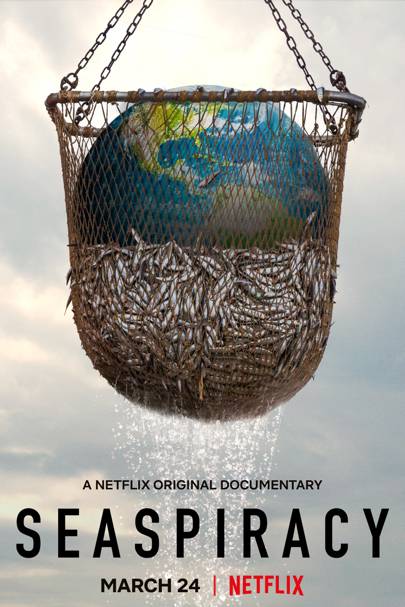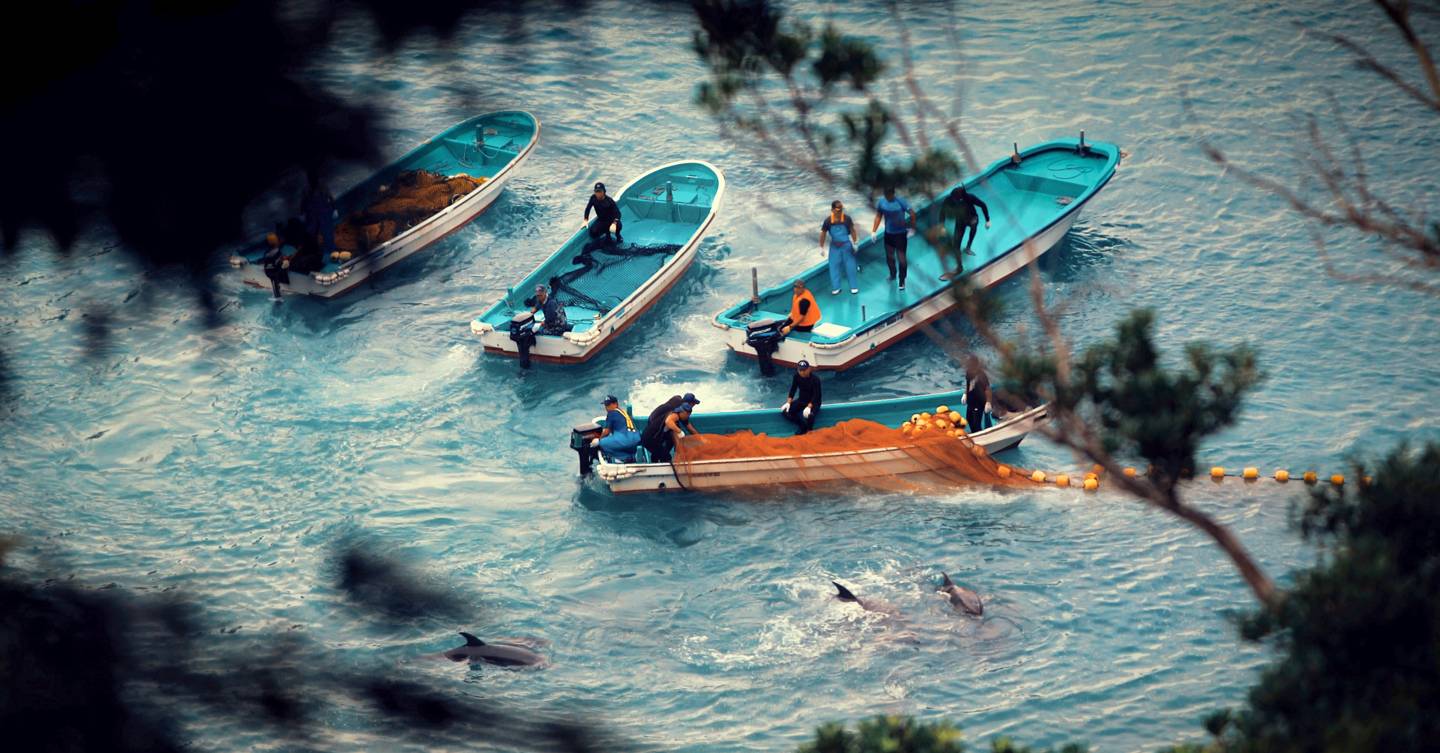If you’re trying to figure out why all of your friends are suddenly proclaiming they are going to stop eating fish in the group chat, it’s probably because they’ve watched Seaspiracy.
The documentary dropped on Netflix last week and tackles heavy topics like over-fishing, modern slavery and marine destruction. Over its 90-minute duration, filmmaker and narrator Ali Tabrizi and his partner travel to Japan, Thailand, Scotland and the Faroe Islands to discover what it means for fishing to be sustainable. It touches on plastic pollution, bycatch (the act of catching other animals unintentionally with fishing nets), illegal fishing and why farming is not the answer.
It’s the follow-up to Cowspiracy, the documentary that made everyone consider being a vegetarian in 2014, and this time it’s making people swear off fish for good.
After watching the doco, one Twitter user said: “The only ethical thing to do is to stop eating fish. #Seaspiracy.”
Another added: “#seaspiracy on Netflix is one of the most horrifying documentaries I’ve ever seen. Do watch it if you care about oceans/fish. I’m gonna stop eating fish, starting today. A must watch.”
So should we sear off fish for good?
“Seaspiracy is a thought-provoking documentary, and it’s designed to be. It’s important to be aware of how our food comes to land on our plates, and Seaspiracy does an incredibly effective job in doing so,” Chris Allsbrook, Nutrition Coach at OriGym Centre of Excellence tells GLAMOUR.
“It’s understandable that you’d be more conscious of the fish you eat, but our suggestion would be to use this newfound knowledge and apply it to the decisions that you make regarding your food. By taking the time to read more carefully over the labels of the fish products you buy, you can make a decision that’s right for both your diet and the conservation of our planet. Or by using more local sources, it’s possible to find out more about the products you’re buying.”
Chris adds that eating fish as part of a well-balanced diet comes with “many diverse benefits”. These include a high Omega3 content (particularly in salmon and tuna) which is a fatty acid responsible for keeping our heart and blood vessels healthy.
“Fish is also a fantastic source of protein, especially for those following a pescatarian diet. Our bodies use protein to repair and develop muscle tissue, as well as maintain the integrity and production of hormones and enzymes,” Chris says.
What about microplastics?
Seaspiracy touches on the fact that most of the fish we consume contain microplastics thanks to the plastic pollution in the ocean, so what’s the deal?
“The air we breathe contains microplastics. In fact, it is estimated we consume about a credit card worth of plastic every week,” Wil Hopson, co-founder of Zested says.
“Fish are particularly unlucky because they live in the plastic swamp we have created in the ocean. Shellfish in particular are full of microplastics. The effects of plastic consumption on this level haven’t really been explored or seen due to it being a fairly recent phenomenon, but we are guessing that it won’t be good.”
Will adds that a simple solution is to reduce your plastic usage where possible and to challenge friends, family, corporations and businesses to be better.

How can we sustainably eat fish?
Vigilance is the most important factor when it comes to eating sustainably-sourced seafood.
“Ensuring farmed fish is sustainable is crucial – we risk upsetting the delicate ecosystem of our oceans if we lose this equilibrium. And while fishing on a mass scale still needs to be adapted, scientists believe that sustainable fishing is possible,” Chris says.
“By implementing more strict regulations on how, where and how much fish can be caught (particularly in areas of consistent overfishing such as the Mediterranean and Black Seas), we can begin to restore balance to our waters. The same is true of farmed fish – by regulating how we fish, and how we control the source of fish that we use, we can ensure that people remain fed, but that we also strike equality between maintaining our oceans and our people.”
Open water fish farms, Will says, are one of the “biggest and most catastrophic environmental hazards there is” and we should only consume fish when we have “asked the right questions”.
“Aside from eating fish a few times a month, getting to grips with where your seafood is coming from is a great way to make sure you’re eating the right stuff,” Will explains.
“Ask your fishmonger about lesser known, but equally delicious, varieties like pollock, hake, coley and whiting. Alongside this, shellfish like oysters, clams and mussels are great as they actually filter the sea and can be labelled as genuinely sustainable. Moving away from the big four (cod, salmon, tuna, prawns) is rewarding, delicious and more sustainable in the long term.”
The best way to be a more mindful consumer is to do your research. Places like the Marine Conservation Society have a breakdown of the fish we see on our supermarket shelves and can show us how they are fished and whether or not they are at risk of overfishing. Chris recommends looking for companies that bear a logo or a statement that says it has committed to fishing in a sustainable way.
“Products that have been marked with the MSC logo have been recognised as having been fished in a sustainable way,” he continues. “These products are available at the vast majority of supermarkets, as well as being part of the ethos of popular seafood companies such as John West, Birds Eye and Princes.”
He also recommends buying locally where you can: “If you’ve got a local fish shop or independently-run business nearby, you can gain more information about the fish you’re buying than you would be able to if you purchased it from a supermarket.”
Are any fish endangered?
“About 90% of the world’s fisheries are either fully or overfished,” Will says. “It is sometimes hard to select species as each fishery has different levels, although again if you wanted a few to definitely avoid, salmon and tuna are firmly off the menu. Both are unicorns of the sea in their importance for ecosystems and food chains. Cod and haddock veer between overfished and fully fished, although there are some sources that are more sustainable that others. Look for the MCS badge or check out their website for more information.”
How can we avoid fish that has been caught illegally or through slavery?
One of the more harrowing parts of the documentary include interviews with former fishery workers in Thailand. “On the whole, it is best to avoid fish from Vietnam and Thailand, as they are the two nations most heavily implicated in slavery scandals,” Will says.
“Long supply chains often muddy the waters of what we can do so best to try to keep it local and the supply chain short. The quickest way to do this is to find a reputable fishmonger who really knows their fish. In terms of human impact, these are the best things to do. In terms of the ethical implications from an environmental perspective, best to step off the classic menu and try new varieties. Look for line caught rather than trawled (the process of scraping huge nets across the sea floor). Companies like Pesky Fish, Kernow Sashimi and Moxons are great sources of knowledge and are full of friendly faces who can point you in the right direction.”
